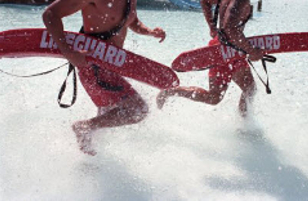 Interested in a great summer job or challenging career as a professional lifeguard? Through videos, group discussion and hands-on practice, you’ll learn teamwork, rescue and surveillance skills, First Aid and CPR/AED and other skills you need to work as a professional lifeguard. Training options feature two core courses—Lifeguarding and Shallow Water Lifeguarding (available in a blended learning format)—plus optional add-on modules, including waterfront skills or waterpark skills modules. Successful completion results in a 2-year certification in Lifeguarding that includes first aid, professional-level CPR and AED in one certificate. Digital certificate available upon successful completion of course.
Interested in a great summer job or challenging career as a professional lifeguard? Through videos, group discussion and hands-on practice, you’ll learn teamwork, rescue and surveillance skills, First Aid and CPR/AED and other skills you need to work as a professional lifeguard. Training options feature two core courses—Lifeguarding and Shallow Water Lifeguarding (available in a blended learning format)—plus optional add-on modules, including waterfront skills or waterpark skills modules. Successful completion results in a 2-year certification in Lifeguarding that includes first aid, professional-level CPR and AED in one certificate. Digital certificate available upon successful completion of course.
Core Courses
Prerequisites: Must be at least 15 years old and pass certain swimming requirements
Course lengths:
Lifeguarding
- Traditional in-person course format 25 hours, 20 minutes
- Blended Learning course format 19 hours, 30 minutes in-person/7 hours 30 minutes online (27 hours)
Shallow Water Lifeguarding
- Traditional in-person course format 24 hours
- Blended Learning course format 18 hours in-person/7 hours, 30 minutes online (25 hours, 30 minutes)
Optional Add-on Modules
Prerequisite: Certification in a core course is required; however, the module may be taught at the conclusion of a core course.
Course lengths:
- Waterfront Skills Module 5 hours, 40 minutes
- Waterpark Skills Module 3 hours, 40 minutes
Lifeguarding Review Course
The Review course is designed to review the lifeguarding skills and core knowledge points required to recertify in lifeguarding.
Prerequisite: Current Red Cross Lifeguarding/First Aid/CPR/AED or Shallow Water Lifeguarding/First Aid/CPR/AED certificate Note: If the Lifeguarding/First Aid/CPR/AED certificate is expired, participants must take the full Lifeguarding or Shallow Water Lifeguarding course.
Course lengths:
- Lifeguarding Review Course 12 hours, 50 minutes
- Shallow Water Lifeguarding Course 11 hours, 50 minutes
Topics include:
- Patron surveillance
- Rescue skills
- Victim assessment
- First Aid
- CPR/AED
- Care for head, neck and spinal injuries




